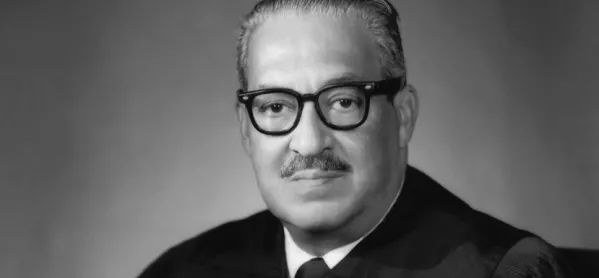- Home
- What educators can still learn from Thurgood Marshall
What educators can still learn from Thurgood Marshall

Thurgood Marshall - the civil rights activist and first African-American Supreme Court justice - was born on this day, July 2, in 1908.
Although he himself was not an educator, his many accomplishments remain highly instructive to those of us working in schools. He is best-known for arguing the Brown v. Board decision of 1954 that required public schools to desegregate. As teachers, we are deeply impacted by this accomplishment.
Yet there is even more in Marshall’s personal story to inspire us to do our best for our students every day.
Like other people of color at the turn of the 20th century, Marshall suffered the indignities and pain of racism directly. Something that is striking about his legacy was Marshall’s ability to use his firsthand experiences to fight passionately against injustice. He used his knowledge and experiences to solve pressing social problems and challenge the tenets of institutional racism.
We have the power to create learning environments that allow our students to do the same and more. Social justice begins with giving our students a voice.
How we view our students matters. By many accounts, Marshall was a boisterous and outgoing student who was often described as unruly. On one particular occasion, when he misbehaved in class, instead of labeling him unteachable, his teacher punished him by having him memorize the Constitution.
Marshall is a study of access to academic rigor and excellence. Throughout his journey as a student, he attended segregated schools as many of this nation’s students do today, yet he was held to a high academic standard. Imagine what our world might have lost, had Marshall been deterred from pursuing academic excellence. Let’s not be the ones who stand in the way of our students’ success.
His professional accomplishments were not only impressive but also a direct expression of his academic prowess. As a civil rights attorney, he won 29 of 32 cases before the Supreme Court. He issued more than 100 cases as a circuit court judge, and none were overturned by the highest court in the land. As the first Black Solicitor General, he served two terms and then went on to be the first Black Supreme Court justice; he served 24 years.
Marshall was a first-generation college graduate whose parents instilled a life-long respect for education. Like many parents, his made major sacrifices to put him and his brother through school. His mother pawned her wedding ring to help pay for his law school tuition. Marshall’s brother went on to become a doctor. It is easy to underestimate the sacrifices our student’s families make to get their children to and through school, particularly when the results are less notable.
Sometimes our students need to travel outside their communities to attend school, and are confronted by unnecessary obstacles along the way. Marshall’s story reminds us just how difficult these realities are. He traveled 40 miles back and forth from Baltimore to attend Howard University where he was both encouraged and challenged.
He graduated with highest honors, but Marshall was denied admission to the University of Maryland Law School, located in Baltimore, because of his race. When he became a lawyer, he represented Donald Murray, another well-qualified African American denied admission by the university and won. The University of Maryland was forced to desegregate.
Marshall could have allowed his own education and professional status to isolate him from uncomfortable and threatening situations. Instead he used them to create positive change.
He visited the Little Rock Nine, the Black students who attempted to attend Central High School after legal desegregation, after they had been denied access to high school by angry mobs. Marshall encouraged them as best he could and tried to reason with local political leaders to protect these students and allow them to attend school unimpeded.
As educators, we have a choice how to respond to our students, especially those in need. When we think about all the young people who are smart, sometimes challenging, and often deterred by circumstances beyond their control, what will we do to encourage them and teach them well?
Marshall left powerful words of wisdom. On June 2, 1966, he spoke at a White House conference on civil rights. Introduced by President Lyndon Johnson, who made an unscheduled but not completely surprising appearance at the conference, Marshall said: “But to those of us who know that struggle is far from over, history has another lesson. It tells us how deeply rooted habits of prejudice are, dominating the minds of men and all our institutions for three centuries, and it cautions us to continue to move forward lest we fall back.”
For educators, those words must continue to inspire us in what we do.
Want to keep up with the latest education news and opinion? Follow TES USA on Twitter and like TES USA on Facebook.
Keep reading for just £1 per month
You've reached your limit of free articles this month. Subscribe for £1 per month for three months and get:
- Unlimited access to all Tes magazine content
- Exclusive subscriber-only stories
- Award-winning email newsletters